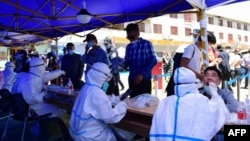The harsh COVID-19 containment restrictions China is imposing across Tibet are leading to public resentment in the capital of Lhasa, where residents who have tested positive are being quarantined in empty stadiums, schools, warehouses and unfinished buildings.
Beijing's actions in Tibet reflect the draconian "zero-covid" policy of President Xi Jinping that has caused discontent and even protests in major cities such as Shanghai and Chengdu.
Social media videos from Lhasa show people waiting to be bused at night to an estimated 20 makeshift quarantine camps. For Lhasa residents the "midnight bus" represents their fears of what they may find once they arrive at crowded and locked quarantine sites.
In one social media video shot in the Muslim Wobaling neighborhood, passengers are seen boarding buses parked in front of one of the city's two mosques.
VOA Tibetan made repeated calls to the Chinese Embassy in Washington for comment but received no response. Xi has made "zero covid" his signature policy for containing the virus with stringent lockdowns and restricted movement, and required testing, tracking and quarantining.
Tibetans, in a rare outburst of open despair, have gone online to Weibo, Douyin and other Chinese social media platforms to draw attention to the situation in the camps that lack adequate hygiene, food and medical care.
Their appeals are remarkable because while the expression of complaints or critical views is risky anywhere in the Chinese state, Tibetans are monitored more heavily and face harsher repercussions than people elsewhere because of the political sensitivity of the region.
In one post, a Tibetan woman said people were being treated like criminals instead of patients. If the authorities are incapable of properly managing these quarantine camps, she said, then they should allow those who test positive to isolate in their homes. "Even if they die, they can at least die in their homes," she said.
Another Tibetan woman said her husband and her three young children were taken to the Lhasa Beijing Middle School Quarantine Center after her COVID-19 test was inconclusive. Authorities required the entire family to quarantine with 800 people. She said her children developed fevers in the school facility where there were no doctors, medicine or medical treatments.
In a viral audio recording, a Tibetan father pleads with a government official at one of the Lhasa quarantine centers to not separate him from his year-old child. "We were first brought to this quarantine camp even though we tested negative for COVID. Now we have tested positive, and you want to take away our child. If we need to move again, we want [to] move together as a family," he said. "If you separate us from our child, I am willing to die right here."
The man then says to listeners, "Please come collect my body after I die."
In Lhasa, the restrictions have been especially difficult for the many people who come from rural areas for low-paying service jobs in the city. One young woman took to Douyin, the Chinese version of TikTok, to appeal to the government to let migrant workers return to their villages. She posted she is running out of hard-earned money and food. If allowed to return home to her village, she said she would not have to pay rent and she would at least have enough to eat.
Other posts describe how authorities are conducting mandatory COVID-19 tests on people once a day under lockdown. In certain areas, people are required to undergo testing twice a day.
Results via phone
Test results are delivered via cellphone, leaving people anxiously checking their cellphones throughout the day. A "red" color notification indicates a positive result, which means the recipient is likely to end up in one of the quarantine camps — with his or her entire family.
People who have tested positive report online that since receiving results their only human contact has come from authorities in white hazmat suits conducting further tests.
Last weekend, some social media posts on some platforms were deleted, and an official warning was issued that accounts sharing these posts would be shut down.
A young Tibetan woman then went online to Douyin to tell her followers that she had been receiving threatening calls from the police. "If I disappear, you know what has happened to me," she said.
On Saturday, a Lhasa municipal spokesperson apologized online for conditions at the camps, saying authorities had been unable to meet people's needs due to the size of the camps.
This is the first time a state official has apologized to people since China seized Tibet more than six decades ago. Even though the overwhelming majority of those in quarantine camps are Tibetan, and most of the complaints being made on social media are in the Tibetan language, the municipal official apologized in Chinese.
On Sunday, Lhasa public security announced that three people had been arrested for posting untruthful information related to the pandemic. The announcement said the "internet is not a lawless land."




